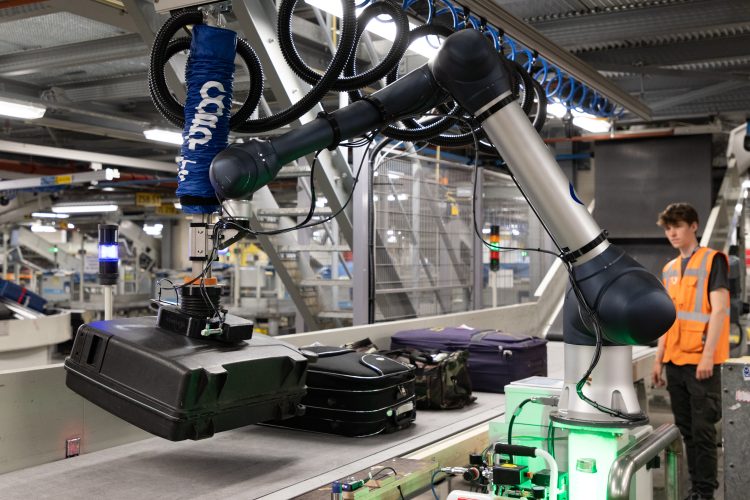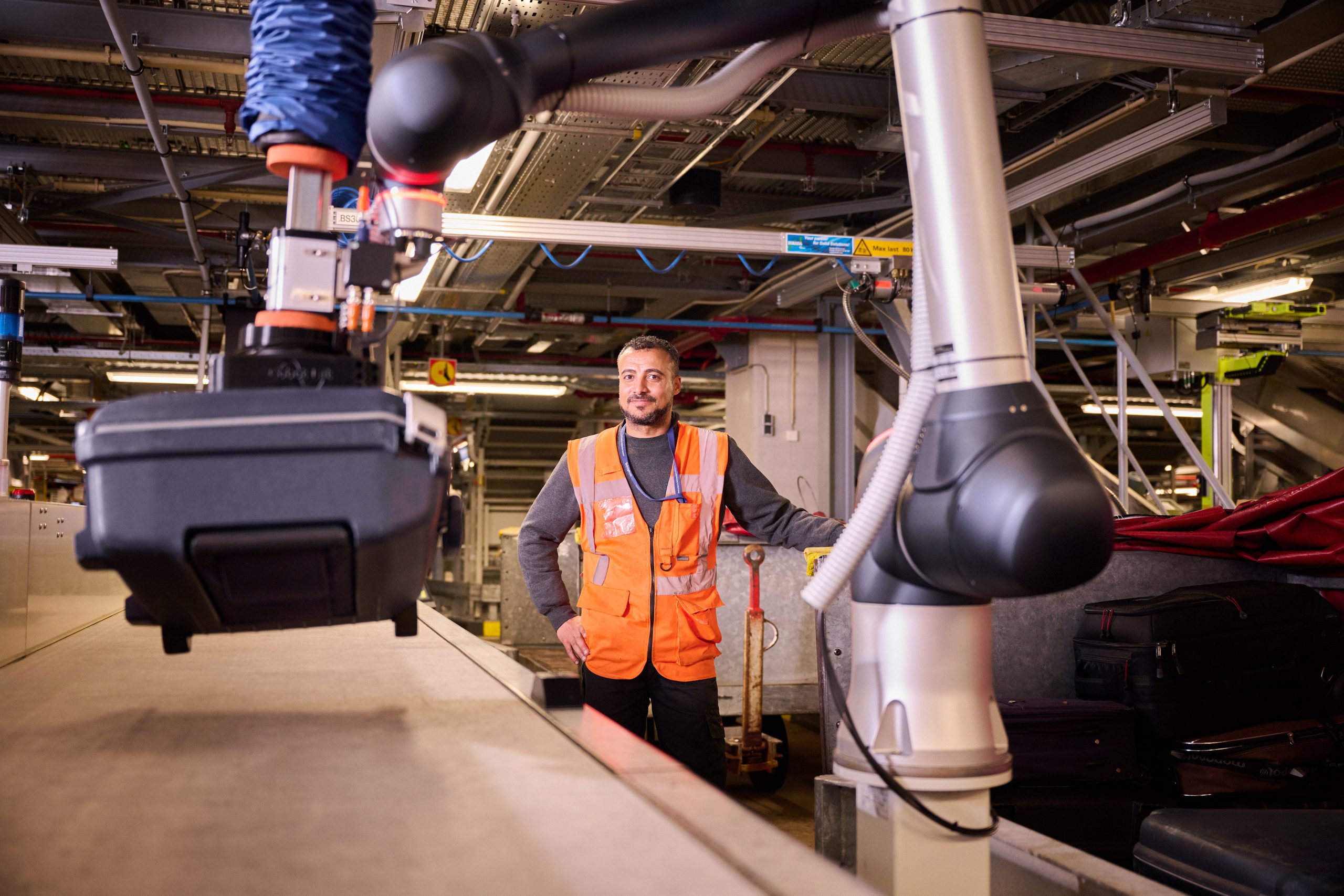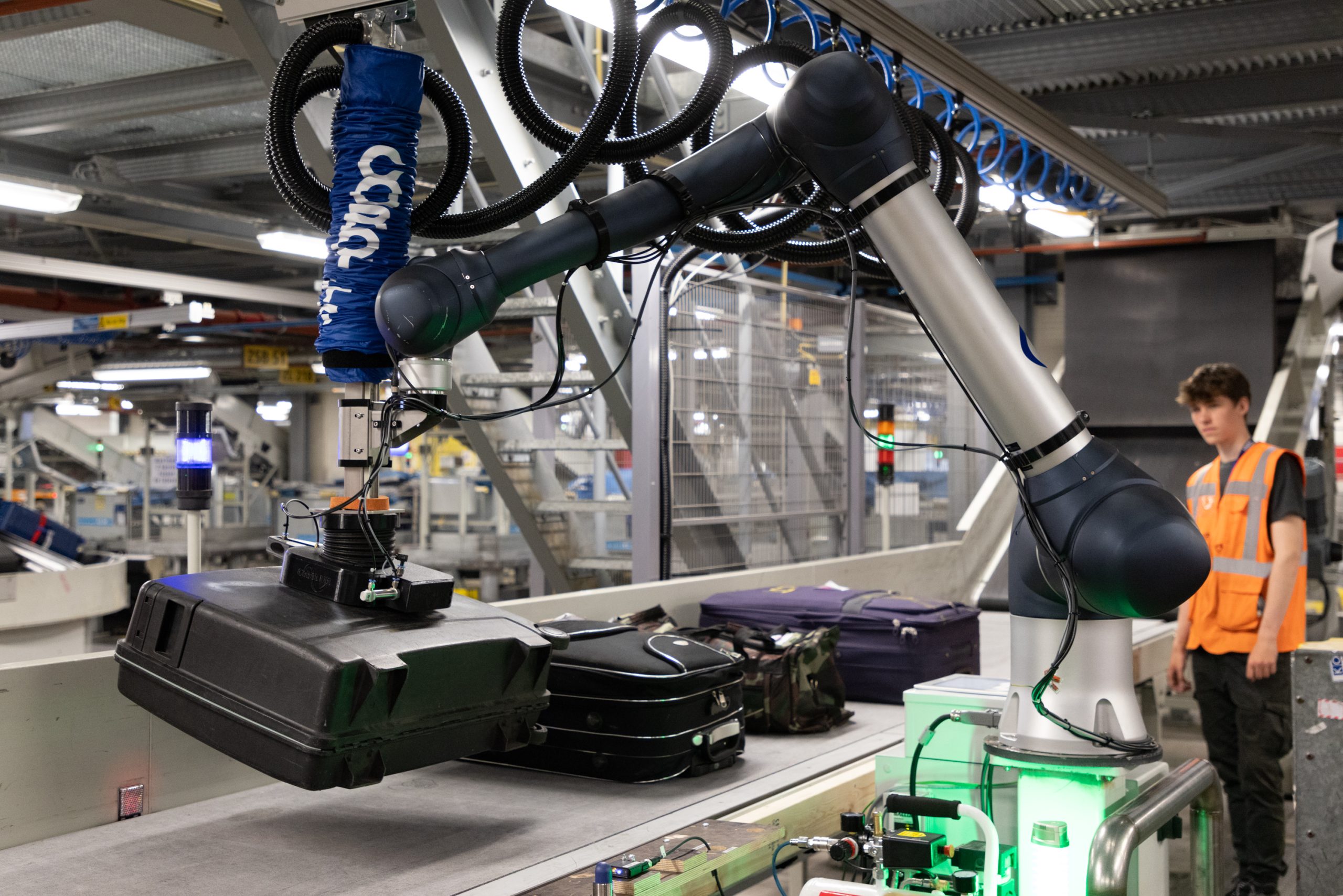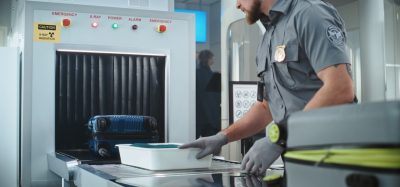Beyond your baggage: Envisioning the future of baggage handling
Posted: 15 January 2025 | Christopher Roos, Zahra Merchant | 1 comment
Zahra Merchant, Chapter Lead Robotics and Christopher Roos, Innovation Lead on Future Baggage from Royal Schiphol Group write exclusively for International Airport Review on what the future holds for the airport’s baggage handling and the innovations they are working on.


Credit: Royal Schiphol Group
In the vast openness of runways and conveyor belts, where time races and jet engines hum, a quiet revolution is underway. Baggage handling, once relegated to mundane conveyor belts, is now poised for a quantum leap. Picture this: Biometric luggage tags that sync seamlessly with your boarding pass, ensuring your bags never stray, autonomous vehicles transporting your luggage to a preferred destination and hold your breath for robots loading your bags in a cart.
Welcome to the era of baggage innovation. As airlines and airports grapple with rising passenger numbers, sustainability imperatives, and the need for seamless travel experiences, several trends are set to redefine how we lug our essentials.
Amsterdam Airport Schiphol, nestled amidst windmill-dotted horizons, has always been a beacon of aviation excellence. One of Europe’s largest and busiest hub airports, we shuttled a grand total of 61.9 million passengers in 2023 alone (Schiphol, 2023). But beyond its day-to-day operations, Schiphol envisions a future to transcend the ordinary. Schiphol isn’t content with merely shuttling passengers; we aim to redefine the very essence of travel. Innovation is at the heart of this mission.
Join us live: Shaping the Next Generation of Hold Baggage and Air Cargo Screening
Join us live for an insightful webinar on 11th December at 14:00 GMT, in collaboration with Smiths Detection, as we explore the strategic balance of operational efficiency, regulatory compliance, and sustainability in high-volume security environments.
This session offers a focused look into future-proofing your security strategy.
Key learning points
- Cost Reduction: Strategies to minimize bag travel time while simultaneously reducing operational costs.
- Regulatory Roadmap: Insights into the next wave of regulatory changes and their impact on future investment decisions.
- Sustainable Systems: Practical approaches to building sustainability into security systems and lowering the total cost of ownership (TCO).
- Scalable Solutions: Real-world examples of scalable systems supporting current airport growth and preparing for tomorrow.
Register now for expert insights, case studies, and actionable strategies on operational efficiency!
Innovation at Schiphol takes place in all parts of the organisation, but at its core lies the centralised innovation hub. Focusing on the second and third horizon problems from the Mckinsey model of Innovation, ‘the hub’ navigates the turbulence, balancing short-term gains with long-term vision (Mckinsey, 2013). As a hub, we connect our ecosystem to new opportunities, advancing technologies and actively shaping the future of the airport. Baggage innovation, although a small part of this larger process, is highly impactful – it’s about reimagining the very fabric of travel, passenger behaviour and optimising airport operations.
However, innovation isn’t all smooth skies. Schiphol faces headwinds—labour shortages, capacity complexities and increased demand for travel. Sustainability issues, once secondary, now demand urgent attention. Amidst the perfect storm, we see these challenges not as obstacles but as wind in our sails to propel us in the right direction and accelerate our innovation. As a good sailor, however, it’s important to keep one eye on the horizon which allows you to navigate and steer towards a preferred destination. Similarly, by exploring market trends and emerging technologies, we have created a future vision in which we tend to look further into the future and steer ourselves in that direction. Peer through the looking glass and glimpse at the future of Schiphol’s baggage process.


Above: Schiphol’s Collaborative Baggage Robot, (CoBRo) is developed by Danish company Cobot Lift and uses an ingenious combination of Doosan robotic arms and vacuum systems to create a highly powerful lifting arm. Credit: Royal Schiphol Group
The future of baggage at Schiphol Airport
“we believe in having a strong responsibility to actively shape a future where robots and people work together harmoniously”
Schiphol envisions a seamless, stress-free journey for every traveller which we can achieve through an empowered workforce and smart systems, a flexible and dynamic operation which is based on data-driven predictability and informed decisions. Global trends suggest that the future consists of a ‘carefree passenger’ – one that values seamless travel, ease of mind and user-friendly services. To achieve this vision and accommodate the needs of our passengers and sector partners, we have identified several pillars within our future vision.
Largely automated / efficient baggage halls including contented baggage workers and pleasant working conditions: The future holds a smart and automated baggage hall that co-exists with humans who feel empowered and happy to work there. Their jobs are more meaningful and reduced physical strain allows them to focus on solving operational problems creatively and assisting the robots when required.
Data driven and predictability: Creating transparency in the current baggage operations and informing stakeholders by collecting and analysing large quantities of data. This will encourage holistic predictability and well-informed decision making resulting in operational excellence and future developments.
Flexibility in operations and systems: Future baggage handling systems and operations should be flexible to accommodate and adapt to innovations and changes. Designing assets and operations to be changed with relative ease during their lifetime will in the future not only allow Schiphol to make better use of baggage innovations, but also be better prepared for massive disruptions such as pandemics.
Empowering the ecosystem: Strengthening strategic partnerships and enhancing collaboration on a global scale to continuously evolve and improve technology developments or solutions for the benefit of the workforce, operations, passengers and stakeholders. Sharing resources and knowledge to fast-track innovation and challenging the industry to develop new solutions.
To exemplify our journey towards this future, three project examples out of the many that are being currently worked on within Schiphol are described. Each example contributes to a certain pillar of the future vision.
Humans and robots collaborating in the baggage hall – CoBRo
As the future vision suggests, we strive towards a near automated baggage hall along with happy and productive baggage employees. A great example to highlight this direction is through the implementation of the Collaborative Baggage Robot, CoBRo, which is a type of COBOT (collaborative robot). On the heels of a successful PoC in July 2023, Schiphol began implementation of a series of CoBRo’s in the baggage halls of Amsterdam airport. ‘COBOT’ is an emerging technology in robotics where an ecosystem is created to allow for a man and robot to safely and efficiently work together as a team in a shared physical space. In this synergetic relationship, the strengths of both humans and robots are used to their best potential. By doing so it increases both the quality of work and life of the workers over time.
Schiphol’s CoBRo is developed by Danish company Cobot Lift and uses an ingenious combination of Doosan robotic arms and vacuum systems to create a highly powerful lifting arm. The robot’s small footprint allows it to be retrofitted into existing infrastructure, enabling Schiphol to quickly make an impact on the physical strain and improve the working conditions. Through a strategy of simultaneous development, testing and implementation, Schiphol and Cobot Lift take an active frontrunner role in further developing this human-robot collaboration and its potential use cases in baggage handling.
Empowering the ecosystem – the BOOST Programme
While the CoBRo is a great example of the successful implementation of new technology to improve baggage handling, such technologies are unfortunately few and far between. A limited market size combined with regulatory constraints and lack of standardisation makes suppliers hesitant to commit to developing new baggage innovations. Simply put, innovating currently introduces a high investment risk set against a low potential return. To make it attractive for tech suppliers to invest time and resources into baggage innovations, we need to reduce risk and increase potential rewards. Schiphol, having realised this challenge is currently paving the way for baggage innovation worldwide by initiating the BOOST programme.
The BOOST programme invites like-minded aspiring airports to collaborate on developing new baggage innovations. Airports each face its own unique challenges, but also share many challenges that are similar in nature and can benefit from a collaborative solution. Instead of individually trying to solve all the problems, the boost programme intends to solve these problems as one and share the learnings from it to reduce time and resources spent to accelerate innovations. The increased interest in baggage innovation will open the doors for tech start-ups and scale-ups, R&D labs and universities to create new solutions. Leveraging economies of scale, the developed solutions will have a larger market, lower development cost and lower risk, making it attractive for these parties to jointly innovate on baggage handling.


Credit: Royal Schiphol Group
Series and movies such as Black Mirror popularise fear and an omnipresence that automation and robotics will take over your jobs and replace you. Despite Schiphol envisioning a strong presence of robotics in our future baggage handling, we know that humans will remain the core and heart of the operation. Therefore, we believe in having a strong responsibility to actively shape a future where robots and people work together harmoniously. Our mission is to create an appealing workplace where healthy, happy and proud people are optimally supported to get the work done.
Fraim is an initiative introduced by Schiphol in collaboration with Technical University of Delft and our flagship carrier KLM baggage handling services to explore the future of work of people and robots in the baggage halls. The five-year initiative focuses on a team of transdisciplinary researchers working closely with the baggage workers to gather insights on their pain points, highlights, challenges and more, which will be translated alongside academia by the researchers towards this future world. The uniqueness of this initiative stems by looking together towards this new future through various lenses such as design, psychology, organisation change and robotics simultaneously, we create comprehensive designs with reduced blind spots and an increased chance of adoption. This is how we gain trust in robotics and create an effective yet pleasant and meaningful future together.
Conclusion
As the sun sets over Schiphol’s iconic control tower, we glimpse a future where baggage isn’t just shuffling suitcases or dunking dufflebags, it’s a canvas for innovation. While we are proud of the steps we are taking towards an innovative future, we are humbled by the call to action and are actively seeking new opportunities and challenges to innovate on. So next time you board a flight, remember that beyond the conveyor belt lies a world where robots lift your suitcases, automated vehicles navigate bags to planes and operators feel happy and proud to be handling your bag.
About the Authors


Christopher Roos
Christopher Roos holds an MSc in Applied Cognitive Psychology from Leiden University with 14 years of working experience in the field of human-machine innovation in aviation. Both Chris and Zahra are both currently working for Schiphol’s Innovation Hub, a central innovation team that orchestrates moonshot projects together with Universities, R&D & industry partners.


Zahra Merchant
Zahra Merchant is the Chapter Lead Robotics on Future Baggage with the Royal Schiphol Group. Zahra holds an MSc in Strategic Product Design from TU Delft. Both Zahra and Chris are both currently working for Schiphol’s Innovation Hub, a central innovation team that orchestrates moonshot projects together with Universities, R&D & industry partners.
Join our free webinar: Beyond silos: How ecosystem thinking elevates the airport experience
In today’s complex aviation landscape, airports are moving beyond siloed operations to embrace a new era of collaboration. This webinar focuses on how leading airports are using ecosystem thinking to adapt, personalize, and continuously improve every touchpoint, boosting both passenger satisfaction and non-aeronautical revenue.
Date: 13 Nov | Time: 10:00 GMT
REGISTER NOW TO SECURE YOUR SPOT
Can’t attend live? No worries – register to receive the recording post-event.
Issue
Related topics
Airside operations, Autonomous Technology, Baggage handling, Big data, Digital transformation, New technologies, Operational efficiency, Passenger experience and seamless travel, Robotics, Sustainability
Related airports
Related airlines
Related organisations
Cobot Lift, KLM, Royal Schiphol Group, Technical University of Delft (TU Delft)



















The use of a CoBRo in Amsterdam Airport Schiphol offers several advantages, such as compact integration into the existing baggage handling process and improved ergonomics.